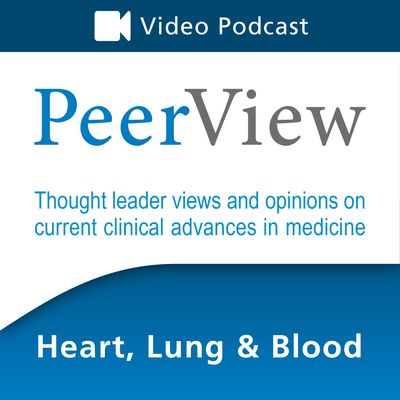PeerView (PVI) is a leading provider of high-quality, innovative continuing education (CME/CE/CPE and MOC) for clinicians and their interprofessional teams. Combining evidence-based medicine and instructional expertise, PeerView activities improve the knowledge, skills, and strategies that support clinical performance and patient outcomes. PeerView makes its educational programming and expert-led presentations and symposia available through its network of popular podcast channels to support specific specialties and conditions. Each episode includes a link to request CME/CE credit for participation. PeerView is solely responsible for the selection of topics, the preparation of editorial content, and the distribution of all materials it publishes.
http://ww2.peerviewpress.com
Marilyn K. Glassberg, MD - Systemic Sclerosis–Associated Interstitial Lung Disease: Expert Insights on Early Diagnosis and Optimal Management
Go online to PeerView.com/UBX860 to view the activity, download slides and practice aids, and complete the post-test to earn credit. Systemic sclerosis (SSc) is a rare, often fatal, connective tissue disease that affects multiple organ systems. Early diagnosis, and thus earlier treatment, is critical to prevent disease progression, with its irreversible fibrosis and organ damage. In particular, regular monitoring for lung involvement, especially interstitial lung disease (ILD), is vital, as ILD occurs in the majority of patients with SSc and is now the number one cause of death in these patients. Treatment for SSc-associated ILD has historically been limited, with no FDA-approved options; however, novel therapies have shown promise in clinical trials. In this PeerView MasterClass, a panel of expert faculty offer insight into the pathogenesis of SSc-associated ILD, the burden of disease on patient quality of life, and diagnostic modalities and challenges. The faculty also discuss risk factors associated with disease progression and severity, current and emerging therapies, and the importance of multidisciplinary treatment and effective patient/provider communication to optimize patient outcomes. Upon completion of this activity, participants should be better able to: Recognize the signs and symptoms of systemic sclerosis (SSc) to facilitate earlier diagnosis and treatment to help prevent disease progression, Assess the relationship between disease pathophysiology and the signs and symptoms of systemic sclerosis-interstitial lung disease (SSc-ILD) and the need for timely screening to initiate appropriate treatment, Employ the latest evidence-based recommendations for diagnosis, risk assessment, and management of SSc-ILD, Evaluate emerging therapies for the treatment of SSc-ILD in terms of their efficacy and safety, Communicate effectively with patients to provide them with disease- and treatment-related education.
